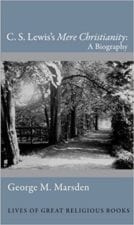Princeton University Press has a series of “biographies” of great religious books, which is in itself a great idea. I had only read one of them before—Alan Jacobs’ bio of the Book of Common Prayer—and so I came with enthusiasm to George Marsden’s “life” of Mere Christianity. The book did not disappoint, and was really gratifying.
Marsden describes the genesis of the book in three series of radio talks that Lewis did for the BBC during the war, and also gives the history of how the three booklets that resulted from those series were blended into what is now Mere Christianity. Lewis had already made his name as the author of The Screwtape Letters, and for a number of years Mere Christianity was content to tag along behind Lewis’s other contributions. But over time, Mere Christianity began to take on a life of its own—the result of celebrity conversions connected to the book (e.g. Chuck Colson), not to mention the formative impact that it had on individuals long before they went on to make their mark (e.g. J.I. Packer, John Stott, N.T. Wright). And as of the writing of this review, 54 years after Lewis died, Mere Christianity (one edition of it) is ranked as #382 on Amazon. Screwtape is #769. The Lion, the Witch, and the Wardrobe is #1,165.
That man’s project is a juggernaut, and the idea of writing a biography of one of his books was on point. This is something that requires an explanation, and focusing on a book instead of the man helps us get at it.
As a result this book is full of information that I had not seen elsewhere. It is well-written, concise, to the point, and informative. I would end this brief review in a crescendo of superlatives, but I do have one gripe.
However comma— it only applies to a mere handful of pages. Not much of a quantitative gripe. But, that said, those pages were uncommonly silly, so something should be said. At the end of chapter seven, Marsden had been working through some of the criticisms that have been leveled at Mere Christianity, and he gets to Lewis’s views “on women and gender” (pp. 149-152). Since we are a generation neck deep in compromise on this issue, Marsden assembles a number of Lewis’s admirers to cough awkwardly on his behalf.
The thing that made this a striking example of non-self-referential irony was the fact that the next chapter was dedicated to explaining the “lasting vitality” of Mere Christianity. This was an outstanding chapter, but the very first point that was made was that Lewis wrote defending “timeless truth” instead of that which is “culturally bound” (p. 154). This is the kind of thing that makes we wonder why they never call on me during the Q&A sessions. I have had my hand up for half an hour now. I wonder if “women and gender” might provide us with any examples of what it might look like to be “culturally bound.” And I wonder what a timeless Christian take on sex roles might look like. And I also wonder if it would result in a lot of throat clearing among those who get to write books for Princeton.
Still, that handful of pages aside, and since I got that out of my system, this is a book that is well worth your time.



I once attempted to write a paper on the topic of women and gender in the Ransom trilogy. It was probably along the same lines of silliness. My excuse is that I was a seventeen-year-old college sophomore. I am glad I do not have to endure the embarrassment of having others see it in print. I do not miss feminism.